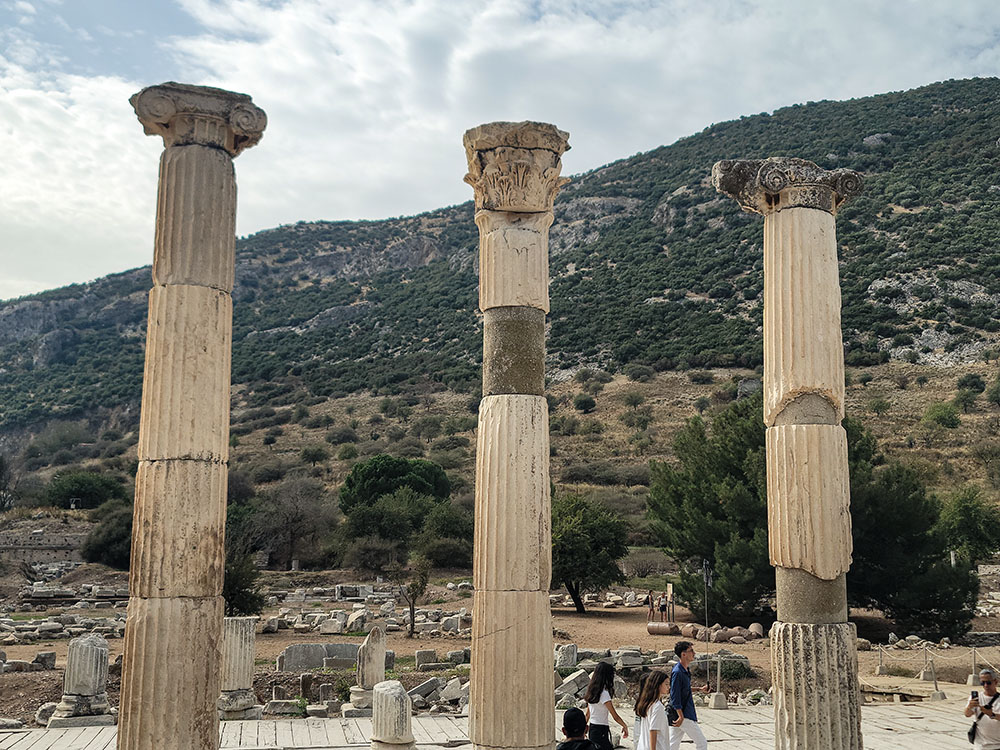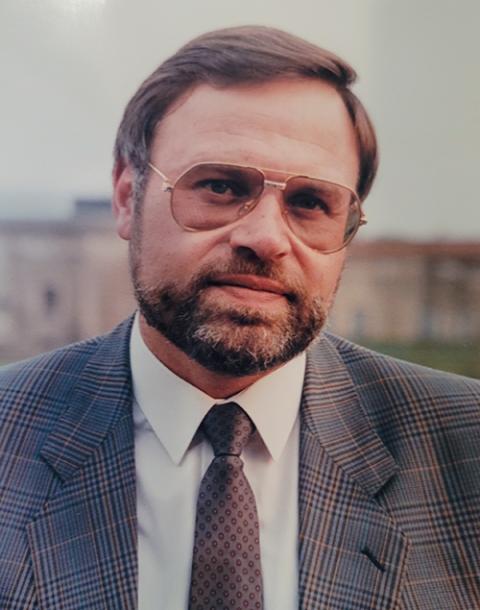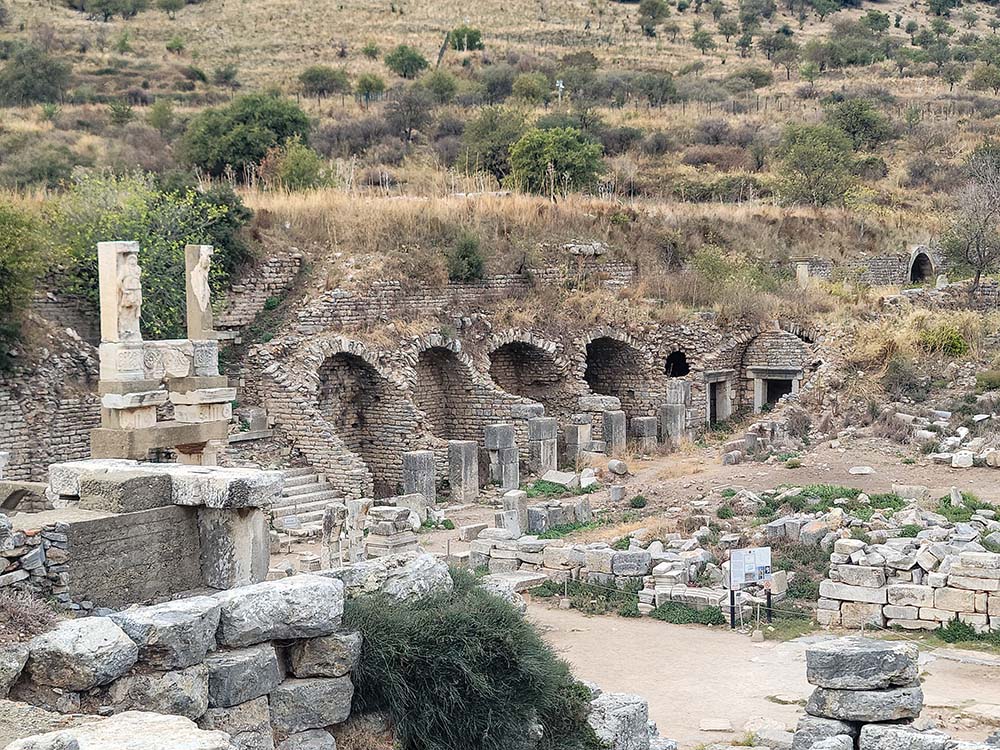
Ruins of the ancient city of Ephesus in 2024, in modern-day Turkey (GSR photo/Gail DeGeorge)
The Bible study tour with Catholic Theological Union wasn't billed as a pilgrimage. If it had been, I may not have gone. Though pilgrimages can be spiritually nourishing, this time I was more interested in delving deeper into the Scriptures, history and tradition that surround what we know about St. Paul's travels in Greece and Turkey and about early Christianity.
Yet it ended up being a pilgrimage of the heart in a way I did not expect. In this season of Easter when we celebrate the sacred foundation of our faith — Jesus' resurrection and the promise of eternal life — I am reminded anew of the lasting lessons I experienced at Ephesus in a deeply personal way.
I was returning to Ephesus 35 years after I had first visited and had made two vows: to embrace life again after a searing, life-changing loss, and a decision to rekindle the Catholic faith in which I had been raised. As a teenager, I had lost that faith because of a tragedy. It took another tragedy to bring me back.
It was in Ephesus on Oct. 12, 2024, on the anniversary of the death of Willy — the man I loved and planned to marry — that I sought to finally lay his ghost to rest. He had given me what I can now finally see as an incredible gift: an unshakeable faith in Jesus' message of eternal life and an assurance that love does last forever. Sometimes, as Willy did, those we love can break through the barrier between this life and what lies beyond.
Willy and I met in Curaçao, where I was on assignment for BusinessWeek. I was a scuba diver and had stayed on the island for a few days longer. A casual lunch at a seaside café lasted all afternoon and into the evening, blossoming into an amazing, international romance of the kind that inspires poetry, songs, novels and movies.
He was from Belgium and spoke seven languages. We would rendezvous in Miami and Mexico City, where we were based for our jobs. He worked for a company that built ports and had traveled and lived all over the world. As a journalist, I too had traveled extensively. He made me tapes of love songs in multiple languages and cherished me in a way no other man ever has.

Willy Otten (Courtesy of Gail DeGeorge)
In the late 1980s, before communication became so instant, we wrote letters and through phone calls dreamed of ways to meld our complicated lives. "Disfruta la vida," he would tell me, in closing his letters and our phone calls. "Enjoy life — every minute of it."
Willy had converted to Catholicism, finding in it a mysticism that eluded him in the Protestant traditions in which he'd been raised.
Despite being raised in a strong Catholic family, I had rejected it at that point in my life in my late 20s, unable to stomach the hypocrisy I'd encountered with too many priests and a rigidity that seemed too unforgiving — and a God that I wasn't sure even existed.
My family went to Mass every Sunday and my parents made sure we all received the sacraments. When our uncle and cousins who were priests visited from my grandfather's homeland of Malta, we even celebrated Mass at our cottage, with the pool table converted to an altar. It was an idyllic time — I felt special to God and even thought of becoming a nun.
But when I was 13, my dear Aunt Betty, my father's sister whose family shared our summer cottage, was diagnosed with a malignant brain tumor. No prayers were answered. Aunt Betty died when I was 18. And by then, I'd lost faith in God and in most people.
Journalism and creative writing became the outlets into which I poured all my energy. Upon graduating with a focus in economic journalism, I landed in South Florida at age 22, a journalist's paradise. I rose quickly through the ranks of regional publications to become the Miami correspondent for BusinessWeek, which is how I'd ended up in Curaçao, chasing a corrupt nest of offshore money-laundering outfits.
Willy and I plotted several scenarios to blend our lives. We met for the last time in Mexico City in July and by then, our plan was clear. He'd finish a project in what was then Zaire, now the Democratic Republic of Congo. He'd return to Belgium on Oct. 15 for a brief stop before heading to Miami where we'd plan our wedding.
I begged him not to go to Zaire. It was dangerous and we didn't need the money. But the company needed him to oversee this project, he told me, promising he'd return. He kept in contact, flying from the remote area on the coast to the capital of Kinsasha about once a week, just to call me.
On the night of Oct. 12, I had three dreams. In the first two, I was frustrated because I could not find him. In the third one, he was talking to me in a conversation as real as any we'd ever had. "I will always love you," he kept saying. "But I have to stay in Zaire."
In tears, I'd kept asking him why. If he loved me, why would he stay? Why not keep his promise? I woke up exhausted, feeling as if I'd never slept.
Oct. 15 came and went with no word from him.
Finally, I wasn't able to take the not knowing and called the company he worked for. When the call was switched to human resources, I knew before I was even told. A plane Willy was on had crashed into the Zaire River. Of the three on board, one man survived; Willy's body was never found. After weeks of fruitless searches, he was presumed dead. The crash happened Oct. 12, the night of the dreams.
Advertisement
I was surprised how much the grief physically hurt. I had suffered the loss of people I loved dearly. But this was different. I carried it in my body. Willy and I had never gotten to the dirty-sock stage of a relationship, so in addition to grieving him, I mourned pure romance — the promise and mystery of love. And since his body was never found, I tormented myself that maybe he wasn't dead after all, that I'd get a phone call that he'd been found wandering in the jungle.
One night the pain was so unbearable, that I nearly did the unthinkable — only a call and the insistence of my friend Carmen to meet in Coconut Grove saved me. I also feared deep inside that I wouldn't get what I wanted, to be with him. Instead, it'd be like I'd always be looking at him through a glass, a barrier so terrible because I would be able to sense him but not be with him. I am so thankful Carmen followed the prompting of the Holy Spirit to cajole me into meeting her that night. People wonder if they should call when someone is grieving. Yes, I say, from experience: Help fill the void. If they want to be alone, they will tell you.
Friends told me I looked better than ever. I dressed carefully, wore more makeup than usual. It felt like I was putting it on a mannequin as I was hollow inside. I was re-creating myself from the outside in.
I found myself arguing with God, who I wasn't sure even existed, and if "he" did, surely he was a cruel God, ready to snatch my joy away if I ever became too happy. If Willy and I weren't meant to be married, we could have parted as friends. Why did he have to die?
I sought counsel and comfort in my grief from an older wise woman friend, Mary. She hugged me and told me how lucky I was. I looked at her in disbelief. Lucky? "Yes," she said. "You are blessed to have had such a love. You know how many people search for that type of love all of their lives and never find it?"
Friends got me a session with a grief counselor, who told me that I needed to create a ritual. Funerals are for the living, she told me. Because I'd been unable to attend the memorial service for Willy in Belgium, I'd had no closure.
So on Valentine's Day, I made the meal I'd planned, went to the little shop in Coconut Grove we used to go to and bought three roses. Two were deep red, one a little taller than the other. (Willy was just a little taller than me.) The third rose was a closed bud of flame red, the color of love. I read our letters and listened to the love songs and tried to say goodbye.
At the end of the night, through my sobs, I said aloud, "They say love lasts forever. They say there's a life after this one. But I'm a journalist and I want proof." I fell asleep, exhausted from crying.
The next morning, the rose that was just a little taller than the other had died. But that flame rose had opened into a beautiful blossom. Through my tears, I smiled, recognizing that there was my proof.
Weeks later, I went to Easter Mass with my family, the readings holding much more meaning than ever.
That fall, some friends planned a trip to Greece and a sailing trip off the coast of Turkey, with stops in Izmir, Ephesus and Istanbul. Sure I'd go. Why not? The distance and differences in scenery and culture served as balm for my soul.

Ruins of the ancient city of Ephesus in 2024, in modern-day Turkey (GSR photo/Gail DeGeorge)
But it was at Ephesus, walking amid the ruins and seeing where St. Paul had preached, that I reached a turning point. There, I made two vows. The first was to return to the religion of my youth. I had tried other faith traditions. But if Willy had decided to become Catholic, and loved me enough to break through the barrier between life and death several times, then I owed it to myself to explore and embrace Roman Catholicism as an adult.
The second was to live as Willy had always told me — disfruta la vida — to enjoy life. The last thing he'd want was for me to go through life as a shadow of myself, to be a bitter, loveless, disappointed soul.
Within a year, I met the man I married and we were blessed with two sons — each a miracle, as I'd been told that I probably would never be able to have children. Unfortunately, in our seventh year of marriage, Shawn wanted a divorce when our sons were just 7 and 4 years old.
I tried desperately to save our marriage. I was forced to file for a divorce I didn't want, but focused on raising our sons in a loving, supportive environment to minimize their stress. Six weeks after Shawn moved out, my dad died of prostate cancer at age 72.
The years flipped by with a focus on family, church and work as an editor. I'd allow myself one day — Oct. 12 — to remember Willy, reread his letters, sometimes listen to the love songs he recorded and dream of what might have been. And on Dec. 31, his birthday, I'd light a candle for the year that had passed and another one for him.
This past Oct. 12, I was at Ephesus again. But instead of reading his letters, I searched my soul. How had I done in keeping those two vows?
In embracing Catholicism, I'd certainly tried. I read extensively, a range of Catholic writers from saints to contemporary authors. I had sent our sons to Catholic school, taught catechism, served on the parish council, restarted the rosary guild and for several years off and on, have gone to daily Mass. Staying Catholic through the abuse scandals, however, was exceedingly difficult.
My role as editor of Global Sisters Report helped keep me Catholic. I have learned so much about the courage and wisdom of sisters who live out the Gospel message in so many meaningful ways.
The church's refusal to allow women their rightful place as deacons and priests, however, is another source of deep disappointment and frustration. Any credible study of early Christianity, including the study tour and lessons by Dominican Sr. Barbara Reid during our journey through Greece and Turkey, shows the vital role of women in spreading the faith.
On the second vow, to disfruta la vida, I think I've done pretty well. As much as I can, I keep up with family members and friends, look for reasons to celebrate and try to find the joy and laughter in life. I am keenly aware of how life can change in an instant. I have taught my now young adult sons, who know that I lost a man I loved before their dad and I married, one of my central beliefs: We cannot control all that happens to us in life, so the only choice we have is how we react to it.
I realize now that my friend Mary was right. I was blessed to experience such a love with Willy. Through the pain of such a deep loss and grief, I've developed a certain resilience, an unshakable faith that has nothing to do with religion.
In this season of Easter, those lessons are as keenly felt now as they were then. I may not have been able to fully lay Willy to rest at Ephesus, but I was able to thank him for coming into my life, and for loving me enough to reach out even in death and the life hereafter. To quote Ephesians 2:8: "For by grace you have been saved through faith, and this is not from you; it is the gift of God."




